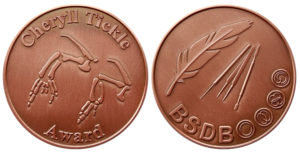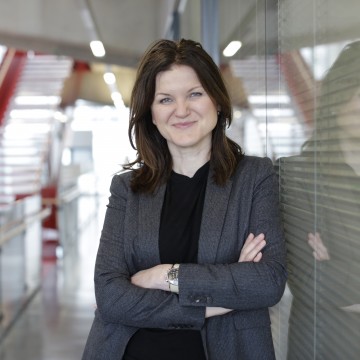In 2016, the BSDB introduced the Cheryll Tickle Medal, which is being awarded annually to a mid-career, female scientist for her outstanding achievements in the field of Developmental Biology.
The BSDB is proud to announce the 2024 awardee is Prof. Petra Hajkova!

 It is with great pleasure that we nominate Professor Petra Hajkova for the Cheryll Tickle Medal. Petra has become such an established member of the field that it will surprise many to learn that she started her lab just 14 years ago. In this short time she has risen through the ranks at the MRC London Institute of Medical Sciences (LMS) from junior group leader (2009) to Epigenetic Section Chair (2018) and on to the Interim Director (2021-2022). All the while she has continued to make the major scientific contributions that have been her hallmark since the start of her research career.
It is with great pleasure that we nominate Professor Petra Hajkova for the Cheryll Tickle Medal. Petra has become such an established member of the field that it will surprise many to learn that she started her lab just 14 years ago. In this short time she has risen through the ranks at the MRC London Institute of Medical Sciences (LMS) from junior group leader (2009) to Epigenetic Section Chair (2018) and on to the Interim Director (2021-2022). All the while she has continued to make the major scientific contributions that have been her hallmark since the start of her research career.
Petra’s interest in DNA methylation started while she was an undergraduate, studying the expression of integrated viral sequences. In her PhD, Petra developed bisulphite sequencing methods and applied them to study epigenetic reprogramming in primordial germ cells (PGCs), in a now classic paper, with >1300 citations (Hajkova et al., 2002, Mech Dev). This longstanding interest in, and fundamental understanding of, DNA methylation underpins her rigorous approach to investigating epigenetic reprogramming and DNA demethylation in PGCs and the zygote; in a field in which many ideas have come and gone. Her postdoctoral studies with Azim Surani further characterised changes in chromatin accompanying DNA demethylation in PGCs (Hajkova et al., 2008, Nature). In a landmark paper Petra and Azim connected DNA demethylation in PGCs to the base excision repair pathway (Hajkova et al., 2010, Science). Petra’s subsequent work has shown that, in contrast to the prevailing dogma, Tet-mediated hydroxylation is not required for DNA demethylation, either in the zygote (Amouroux et al., 2016, Nature Cell Biology) or in PGCs (Hill et al., 2018, Nature). Rather Tet proteins protect against de novo demethylation following reprogramming. Further mechanistic work in the zygote showed that continuous histone replacement is required for transcriptional regulation and epigenetic programming (Nashun et al., 2015, Mol Cell).
How the epigenome is regulated in different pluripotent states – both in vivo and in vitro – has been an ongoing interest. Petra was the first to show that mouse embryonic stem cells (ESCs) grown in 2i media exhibit global DNA hypomethylation (Leitch et al., 2013, NSMB). This study also demonstrated that mouse embryonic germ (EG) cells are transcriptionally indistinguishable from ESCs, arguing against an epigenetic or transcriptional memory of their distinct origins. More recently, with Anja Groth, Petra has developed isolation of DNA by 5-ethynyl-deoxyuridine labelling for mass spectrometry (iDEMS) (Stewart-Morgan et al., 2023, Nature Cell Biology). A versatile technique with many applications, this provided new insights into the restoration kinetics of DNA methylation in ES cells, revealing that maintenance methylation fails to keep up with cell division in mouse ES cells.
Petra has also influenced how we view the biological function of epigenetic reprogramming. Her work suggests that this process is required to enable PGCs to transition to gonocytes and prepare cells to initiate meiosis, rather than simply achieving imprint erasure (Hill et al., 2018, Nature). A more recent study revealed sex-specific epigenetic regulation and the necessity for dynamic alterations in repressive chromatin in PGCs (Huang et al., 2021, Nature). Conceptually this distinguishes epigenetic regulation in the germline, a lineage characterised by developmental reprogramming from that in soma which undergoes progressive differentiation. Overall, Petra has made key contributions to our understanding of epigenetic regulation during germline and pre-implantation development. Petra is also highly collaborative, as evidenced by an array of insightful publications across diverse fields, including myeloid cancer, microglial biology, alternative TSS usage, sperm biology and nematode evolution.
Beyond research, Petra is an excellent colleague and leader, as evidenced by her prize for mentoring and the plaudits she received as leader of the LMS Epigenetics section, which scored highly at quinquennial review. During turbulent times, she stepped up to be interim director at the LMS, where she championed the cause that fundamental research should remain central to the new strategy envisioned for the LMS. Petra’s other prizes and achievements are detailed in her CV, and we would strongly advocate that the Cheryll Tickle Medal is added to these.
-
- Harry Leitch
- Ian Chambers
